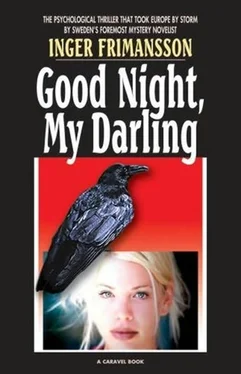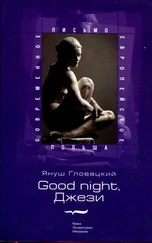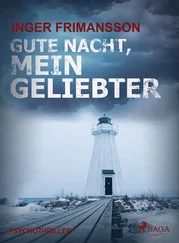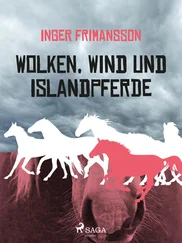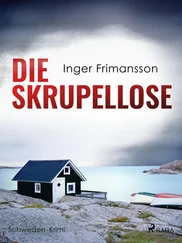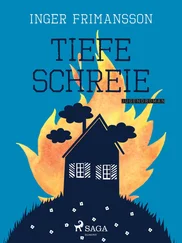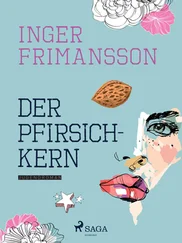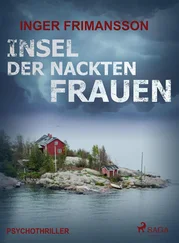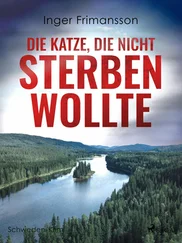Until it finally hacked itself to pieces, until it transformed into crying.
Then there was Martina’s parents. A very absurd story in itself.
Hans Nästman, a policeman who had spoken to her quite a bit, insisted on this.
“Of course I want to meet with them,” she said. “It’s just been so difficult. I’ve been so tired.”
She did not want them in her house. She didn’t say that to Hans Nästman, though. She said, “Can we meet in a room at the police station?”
“I’ll take care of it,” he promised.
He even came to pick her up. It was a normal, neutral car and he was wearing normal clothes.
“You have a nice place here,” he said, and looked out over the lake. “And the boat down there; it’s not exactly small.”
“It was my father’s.”
“Not bad at all. Can you drive it?”
“I haven’t driven it very far. Just around and about on the lake. But maybe I’ll take a longer trip someday, maybe to Gotland or Åland.”
“Well, you’ll have to get more practice in. Have you taken a skipper’s examination?”
He was speaking with a trace of dialect; it seemed like the Värmland one.
The bird was in the attic. For some reason she didn’t want Hans Nästman to see him. She locked the door and followed him.
The car smelled new, a good smell. She thought about her old Opel and maybe it was just this moment that she decided to buy a new car.
Too late, she noticed they weren’t heading to the police station on Kungsholmen.
“Where are we going?” she asked.
“They live in Djursholm. They wanted to have you visit them in their home.”
A pain in her head, as if her head were shrinking.
“What’s wrong? Do you have something against it?”
“Not at all. It’s just the smell in the car… I just feel a little carsick. Maybe we could roll down the window just a little bit?”
Their last name was Andersson. She realized that she had never known what Martina’s last name had been. Their house was as gray as a bunker with high narrow windows.
“I wonder if this is a Ralph Erskine,” said Hans Nästman. “What?”
“The guy who designed the place, I mean.”
“No idea.”
He walked closely behind her, so closely that he almost stepped on her heels.
“Nice area,” she said, to have something to say. “Yes, indeed. I wouldn’t have anything against living here.
But you can’t complain. Where you live is just as nice.”
The door was made from a massive piece of wood. There was a door knocker in the shape of a lion’s head. Hans Nästman was about to use it when the door opened. A man wearing a dark suit was standing in the doorway.
“Not to bother with that,” he said. “You can’t hear it from the inside anyway. It’s mostly there as a decoration.”
He was thin and tanned; he wore his hair in a ponytail. He gripped her hand.
“Mats Andersson. Welcome.”
Hans Nästman held onto her elbow, guided her into the house. She could sense movement in the house.
“Come in, my wife will be joining us soon.”
He lowered his voice.
“This has been… how should I put it… difficult for her, naturally, for both of us.”
They entered a large, longish room, decorated totally in black and white. There was a grand piano in the middle of the room. The sun burst into the room through narrow windows making a staff-like pattern. A row of black leather armchairs stood against one wall. Next to them, some kind of altar had been placed, with candles in silver candlesticks and a photo of Martina, happy and smiling, wearing a dress of lilac linen. One could see her nipples through the fabric.
The policeman went up to the photo.
“Yes,” said her father. “That’s her.”
“I thought so. When was it taken?”
“Last summer, during one of those really hot days. She loved the heat; she never should have been born in a country like ours.”
“So she was twenty-four when it was taken?”
Her father said, “Yes, she should have been. Excuse me for a moment; I need to…”
And he disappeared from the room, and everything was silent.
They sat down beside each other on the armchairs. The grand piano’s lid was lifted; it was a Steinway.
“Maybe you’ve heard of Mats H. Andersson?” the policeman asked. “He’s a famous concert pianist. Or maybe you don’t know much about classical music?”
Her eyes rested on the piano’s emblem, it was embellished with gold and looked like a cognac cup. She suddenly had a longing for a glass of port or sherry.
They heard Martina’s pappa talking out there, exhorting, like talking to a puppy. Then he stood in the doorway with a tray and some coffee cups.
“My wife will come in just a minute,” he said, almost shrilly.
She entered, her head cast down. She was younger than Justine had imagined. She had Martina’s dark hair and somewhat squinting eyes. There was something sluggish and slow about her.
“Marianne,” she said and reached out her hand. “I’m taking Sobril right now. I assume it’s not something I can hide.”
Her husband entered with a coffee pot. When he began to pour, the lid fell off and knocked over one of the cups. Her face looked like a polecat.
“I can’t stand that noise, I’ve said,” she exclaimed. His earlobes turned red.
“My fingers are anything but practical,” he tried to joke. The woman walked around the room. She was barefoot;
there was a narrow ring on one of her toes. She threw her hair back; strange sounds came from her.
“To lose a child,” she chanted. “To lose a beloved child.”
“Was she your only daughter?” asked the policeman.
“Yes,” answered Mats Andersson. “We also have a son. He lives in Australia. Of course, he’s coming home for the funeral. Otherwise, he doesn’t come home very often. Excuse me; I’m just going to get something to clean up the mess.”
“The funeral, yes… you’ve received her back home, I’ve heard.”
The woman stopped pacing.
“In a box! Like a piece of freight!”
She stood in front of Justine; she fell on her knees onto the white shag rug. Let her head rest in Justine’s lap; she was warm and shaking. She turned her face to Justine’s legs and suddenly bit down hard. Justine gasped; she slapped her hand on her mouth and stared at the policeman. He was there right away, lifted up Marianne Andersson and helped her to an armchair.
“How are you, Marianne?” he asked. “How are you?”
Her narrow eyes shone. She opened her lips, her mouth, but shut them again.
Her husband came back with a rag. Clumsily, he began to wipe up the spilled coffee.
Marianne Andersson said, in a completely normal voice, “Now, if we may, we would like to ask a few questions to the person who was the last one to see our daughter alive.”
“Yes, Justine Dalvik, here,” said the policeman.
“I really wasn’t the last person to see her alive. That one is in Kuala Lumpur, the person who… killed her. He was the last one.”
The woman turned to her.
“Don’t play with words, please. It’s difficult enough as it is.”
“Please listen,” said the policeman. “We are all deeply affected by what has happened. Our nerves are on edge. Justine Dalvik shared a room with your daughter. She has testified that she was in the shower when it happened.”
“May I ask any question I want?” asked the woman.
“Yes?”
“There’s a few things that I have been wondering about.”
“Ask away.”
“When you came out of the shower… were you naked then?”
“No… I had a bath towel around me.”
“Was that man just standing there? Didn’t you hear him come in?”
Читать дальше
